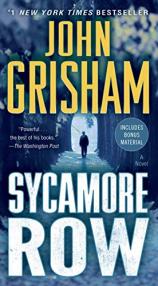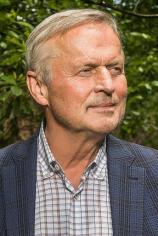Excerpt
Excerpt
Sycamore Row

1
They found Seth Hubbard in the general area where he had promised to be, though not exactly in the condition expected. He was at the end of a rope, six feet off the ground and twisting slightly in the wind. A front was moving through and Seth was soaked when they found him, not that it mattered. Someone would point out that there was no mud on his shoes and no tracks below him, so therefore he was probably hanging and dead when the rain began. Why was that important? Ultimately, it was not.
The logistics of hanging oneself from a tree are not that simple. Evidently, Seth thought of everything. The rope was three-quarter-inch braided natural Manila, of some age and easily strong enough to handle Seth, who weighed 160 pounds a month earlier at the doctor's office. Later, an employee in one of Seth's factories would report that he had seen his boss cut the fifty-foot length from a spool a week before using it in such dramatic fashion. One end was tied firmly to a lower branch of the same tree and secured with a slapdash mix of knots and lashings. But, they held. The other end was looped over a higher branch, two feet in girth and exactly twenty-one feet from the ground. From there it fell about nine feet, culminating in a perfect hangman's knot, one that Seth had undoubtedly worked on for some time. The noose was straight from the textbook with thirteen coils designed to collapse the loop under pressure. A true hangman's knot snaps the neck, making death quicker and less painful, and apparently Seth had done his homework. Other than what was obvious, there was no sign of a struggle or suffering.
A six-foot stepladder had been kicked aside and was lying benignly nearby. Seth had picked his tree, flung his rope, tied it off, climbed the ladder, adjusted the noose, and, when everything was just right, kicked the ladder and fell. His hands were free and dangling near his pockets.
Had there been an instant of doubt, of second-guessing? When his feet left the safety of the ladder, but with his hands still free, had Seth instinctively grabbed the rope above his head and fought desperately until he surrendered? No one would ever know, but it looked doubtful. Later evidence would reveal that Seth had been a man on a mission.
For the occasion, he had selected his finest suit, a thick wool blend, dark gray and usually reserved for funerals in cooler weather. He owned only three. A proper hanging has the effect of stretching the body, so Seth's trouser cuffs stopped at his ankles and his jacket stopped at his waist. His black wing tips were polished and spotless. His blue necktie was perfectly knotted. His white shirt, though, was stained with blood that had oozed from under the rope. Within hours, it would be known that Seth Hubbard had attended the 11:00 a.m. worship service at a nearby church. He had spoken to acquaintances, joked with a deacon, placed an offering in the plate, and seemed in reasonably good spirits. Most folks knew Seth was battling lung cancer, though virtually no one knew the doctors had given him a short time to live. Seth was on several prayer lists at the church. However, he carried the stigma of two divorces and would always be tainted as a true Christian.
His suicide would not help matters.
The tree was an ancient sycamore Seth and his family had owned for many years. The land around it was thick with hardwoods, valuable timber Seth had mortgaged repeatedly and parlayed into wealth. His father had acquired the land by dubious means back in the 1930s. Both of Seth's ex-wives had tried valiantly to take the land in the divorce wars, but he held on. They got virtually everything else.
First on the scene was Calvin Boggs, a handyman and farm laborer Seth had employed for several years. Early Sunday morning, Calvin had received a call from his boss. "Meet me at the bridge at 2:00 p.m.," Seth said. He didn't explain anything and Calvin was not one to ask questions. If Mr. Hubbard said to meet him somewhere at a certain time, then he would be there. At the last minute, Calvin's ten-year-old boy begged to tag along, and, against his instincts, Calvin said yes. They followed a gravel road that zigzagged for miles through the Hubbard property. As Calvin drove, he was certainly curious about the meeting. He could not remember another occasion when he met his boss anywhere on a Sunday afternoon. He knew his boss was ill and there were rumors he was dying, but, like everything else, Mr. Hubbard kept it quiet.
The bridge was nothing more than a wooden platform spanning a nameless, narrow creek choked with kudzu and crawling with cottonmouths. For months, Mr. Hubbard had been planning to replace it with a large concrete culvert, but his bad health had sidetracked him. It was near a clearing where two dilapidated shacks rotted in the brush and overgrowth and offered the only hint that there was once a small settlement there.
Parked near the bridge was Mr. Hubbard's late-model Cadillac, its driver's door open, along with the trunk. Calvin rolled to a stop behind the car and stared at the open trunk and door and felt the first hint that something might be out of place. The rain was steady now and the wind had picked up, and there was no good reason for Mr. Hubbard to leave his door and trunk open. Calvin told his boy to stay in the truck, then slowly walked around the car without touching it. There was no sign of his boss. Calvin took a deep breath, wiped moisture from his face, and looked at the landscape. Beyond the clearing, maybe a hundred yards away, he saw a body hanging from a tree. He returned to his truck, again told the boy to stay inside and keep the doors locked, but it was too late. The boy was staring at the sycamore in the distance.
"Stay here now," Calvin said sternly. "And don't get out of the truck."
"Yes sir."
Calvin began walking. He took his time as his boots slipped in the mud and his mind tried to stay calm. What was the hurry? The closer he got the clearer things became. The man in the dark suit at the end of the rope was quite dead. Calvin finally recognized him, and he saw the stepladder, and he quickly put the scene and the events in order. Touching nothing, he backed away and returned to his truck.
It was October of 1988, and car phones had finally arrived in rural Mississippi. At Mr. Hubbard's insistence, Calvin had one installed in his truck. He called the Ford County sheriff's office, gave a brief report, and began waiting. Warmed by the heater and soothed by Merle Haggard on the radio, Calvin gazed through the windshield, ignored the boy, tapped his fingers along with the wipers, and realized he was crying. The boy was afraid to speak.




